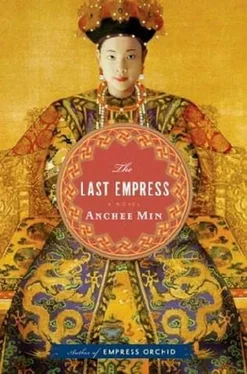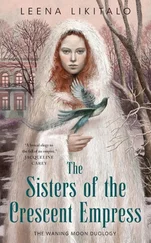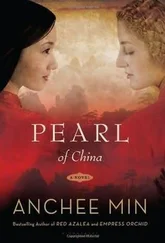On October 1, we left Taiyuan for Tung-kuan. Turning due west for the final seventy miles, we marched through Shan-hsi province to arrive at Sian, the Moslem state still controlled by General Tung's loyalists. While the court believed that we could hold out indefinitely, the Emperor and I became suspicious of the Imperial Guards-men who recognized no authority but General Tung's.
My jade comb was missing. Li Lien-ying, who carried the comb, believed that it had been stolen while he slept. He cursed and vowed to catch the thief. I told him I wouldn't mind borrowing another's comb, but Li Lien-ying refused: "I don't want you to end up picking someone else's lice eggs."
When we reached Tung-kuan I received a telegram from Li Hung-chang reporting that the negotiations had come to a halt. "The Allies demand we show evidence of punishment," Li wrote.
I was expected to hand over General Tung and Prince Ts'eng. I had never felt so manipulated. No matter how I justified it, I would be betraying my own people.
It wasn't until the arrival of Yung Lu that General Tung complied with the throne's instructions to reduce his troop strength by five thousand. He withdrew to the distance the Allies had requested, outside of Peking, which meant our further vulnerability.
Li Hung-chang sent me a transcript of his day's negotiations as a reply to my complaints regarding the foreigners' demands:
ALLIES: Do not such people as Prince Ts'eng and his Ironhats deserve death?
LI: They did not accomplish their purpose.
ALLIES: Sixty people were killed and one hundred sixty wounded in the legations.
LI: The number of deaths of Ironhats, Boxers and civilians of China were in the thousands.
ALLIES: What would you think if the Prince of Wales and cousins of the Queen had headed an attack on the Chinese minister in London?
LI: The Ironhats were foolish people.
Under pressure from Li Hung-chang, on November 13 I issued an edict announcing punishments. Prince Ts'eng Junior and his brothers were to be imprisoned for life at Mukden, near Manchuria. His cousins were to be either placed under house arrest or degraded in rank and would lose all of their privileges. The punishment of the former governor of Shantung was waived because he had died. Other governors who had failed to protect the foreign missionaries were to be banished for life, exiled to the remote frontier in Turkistan and condemned to hard labor. Master Red Sword and two other ringleaders, who were distant royal relatives, were to be executed.
The Allies considered the punishments inadequate. They called what had happened "unprecedented in human history, crimes against the laws of nations, against the laws of humanity, and against civilization."
I had no other choice but to issue another decree assigning stiffer sentences. I failed to please the Allies again, for my words were believed to be worthless-and I would surely find a way to help the criminals evade punishment.
In order to prove myself, I invited the foreign press to witness a public execution, to be held at the vegetable market on Greengrocer Street in central Peking.
The locals suffered tremendous humiliation when the tall, high-nosed, blond-haired foreigners showed up with their flashing cameras.
"It is impossible to know what large fee was paid to the executioner," George Morrison of the Times wrote of the event. "Two mats were laid down. There was a great crowd, a multitude of correspondents, and photographs by the score were taken. Rarely has an execution been seen by so many nationalities… One slice in each case was sufficient."
The journalists cheered when the heads rolled.
I was deeply ashamed.
At the Allies' request, I ordered the execution of ten additional Boxer ringleaders. Except for the two beheadings carried out in public, the rest I granted an honorable suicide.
Family members came begging for the lives of their loved ones. "Your Majesty supported the Boxers," they cried, gathering outside my palace. Their petitions were written in blood.
I hid behind my gate, peering out like a coward. I sent Li Lien-ying to offer the wives and children a few taels for the winter. It was impossible to forgive myself.
Li Hung-chang argued back and forth with the Allies over the life of General Tung. They yielded only after an understanding was reached that the general could be useful in ensuring stability in northwestern China. Tung was deprived of his rank, but he would be allowed to remain the warlord of Kansu if he departed the capital immediately and permanently.
Yung Lu carved out a portion of his army expenses and delivered the taels to General Tung. It would keep him from calling for a rebellion.
Emperor Guang-hsu and I received the Twelve Articles, as they were called, from the allied nations regarding the final terms. Members of the Clan Council and the court telegraphed Li Hung-chang requesting substantial changes. Li replied that he could do no more. "The attitude of the foreign powers is stern, and the contents are not open to discussion," he said. "The Allies have been threatening to break off negotiations and move their troops forward."
In the spring of 1901, the Emperor and I gave permission for Li Hung-chang to accept the terms. There were no words to describe my shame and pain. At the same time, I learned that Li had been gravely ill, so ill that he had to be helped by servants to the negotiating table. Li did not reveal until then what would have upset me the most: that the Allies had originally required that I step down as the head of the government and restore the rule of Emperor Guang-hsu; that all of China's revenues be collected by foreign ministers; and that Chinese military affairs be overseen by foreigners.
"What I have achieved is hardly any bargain," Li's memorandum read. "The reason I pushed the signing was because I'm afraid that my time is running out. It would be regrettable if I died before completing the mission that Your Majesty had entrusted me with."
On September 7, 1901, after bringing China to its knees, the Allies signed the peace agreement. I would suffer eternal torment, for China was forced to apologize to Germany and Japan, which meant enormous indemnities and surrendering natural resources. China was ordered to destroy its own defensive facilities and had to accept a permanent foreign military presence in Peking.
On the morning of October 6, the Allies began to withdraw from Peking and I was able to depart Sian for home. Our procession would travel seven hundred miles on the return journey. After nearly a year of exile, every effort was made to regain face. There would be no sleeping rough this time. Guang-hsu and I each rode in our own covered carriages decorated with flags and banners. We were surrounded by cavalrymen in brilliant silk. Provincial governors were notified of our passing and made sure that every inch of road was cleared of stones. In a ceremony to chase away bad spirits, eunuchs walked ahead and swept the roads and sprinkled yellow chalk to invite favorable spirits. Wherever we stopped for a rest or for the night, banquets were held. The court toasted its luck in surviving the deadly ordeal.
Yet I couldn't help but feel bitter.
China had been given a good kicking, and the burden of huge debts would keep us on our knees indefinitely. But according to Li Hung-chang, it wasn't the mercy of the Western powers that had mitigated their demands. What stayed their hand was the idea that China would someday be a vast economic market. Their business sense told them not to plant the seed of hatred in the hearts of the Chinese people-their future customers-or to destroy China's ability to buy foreign goods. My government was merely a useful tool, especially when the foreign powers considered the likelihood that Guang-hsu would be restored as a puppet emperor.
Читать дальше












